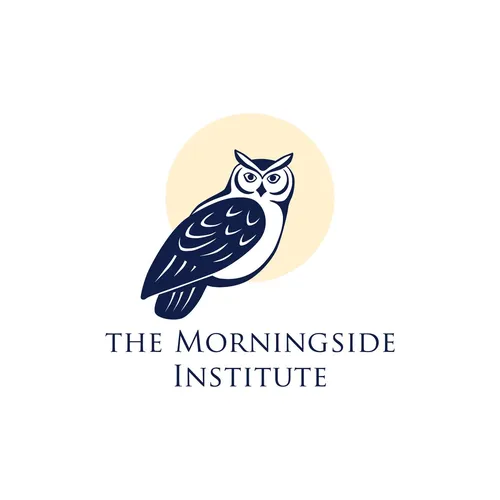
The Morningside Institute
The Morningside Institute is an independent scholarly endeavor dedicated to examining human life through the liberal arts. Morningside helps scholars and students contribute to academic disciplines and understand them in light of the rich traditions that lie at their origin. The Institute also helps students integrate the beauty of culture in New York City with their search for truth in the intellectual life.
- Update frequency
- every 18 days
- Average duration
- 141 minutes
- Episodes
- 60
- Years Active
- 2019 - 2025

Living Well at the End of a World: Angel Adams Parham on “Remembering America: The High Stakes of Memory and Moral Imagination in Civic Life”
In her talk, “Remembering America: The High Stakes of Memory and Moral Imagination in Civic Life,” Angel Adams Parham explores how narratives of the American past, especially those concerning slavery…

Living Well at the End of a World: Antón Barba-Kay on “These United States of Books: What Democracy Will Endure Its Digitalization?”
In his talk, Antón Barba-Kay probes how the logics of the digital world—endless choice, algorithmic optimization, and a veneer of neutrality—quietly erode the habits of judgment and shared reality th…

Living Well at the End of a World: Stephen Bullivant on “Demography, Religion, and the Eight-Billion Body Problem”
In his talk, “Demography, Religion, and the Eight-Billion Body Problem," Stephen Bullivant delves into the complex interplay between declining fertility rates, evolving religious landscapes, and shif…

Living Well at the End of a World: Sarah Shortall on “Soldiers of God in a Secular World”
In her talk at Living Well at the End of a World, Sarah Shortall examines the experiences of French Jesuit priests during the late 19th and early 20th centuries, a period marked by anti-clericalism a…

Living Well at the End of a World: James Hankins on “Restoring Classical Civilization in the Renaissance”
In this talk at Living Well at the End of a World, James Hankins draws parallels between our contemporary anxieties about civilizational decline and the late medieval Renaissance period, specifically…

Living Well at the End of a World: Bp. Erik Varden on “Monastic Culture as Creative Subversion”
In his talk at Living Well at the End of a World, Bishop Erik Varden discusses the end of our “internal world”—the microcosm of human life—at the deathbed and the monastic venture to confront death a…

Believe, with Ross Douthat
In his new book Believe, NY Times correspondent Ross Douthat offers a blueprint for thinking one's way from doubt to belief. Douthat argues that religious belief makes sense of the order of the cosmo…

The Metamorphoses in the Twenty-First Century
The Metamorphoses is a work with an insistent modern resonance and relevance. In terms of Roman political commentary, socio-cultural implication, historical awareness, and psychological investigation…

Is Virtue Sufficient for Happiness?
According to ancient philosophers, all human beings want to be happy. But how can we achieve this? In Books 3 and 4 of his dialogue “On the Greatest Good and Evil” (De finibus bonorum et malorum), C…

Secular Hope
Tradition describes courage, moderation, justice, and prudence as the cardinal virtues (a list going back to Plato) and faith, hope, and charity as the theological virtues (a list going back to Saint…

Natality and the Counter-Tradition of Birth
Birth is one of the most fraught and polarized issues of our time, at the center of debates on abortion, gender, work, and medicine. But birth is not only an issue; it is a fundamental part of the hu…

Language Rights and Wrongs: Originalism, Textualism, Traditionalism, or Activism?
On October 9, 2023 the Morningside Institute and the Galileo Center at Columbia Law School hosted Joshua Katz (AEI) for the last lecture in our series Language Rights and Wrongs. This series explores…

Language Rights and Wrongs: Is Language Truthful?
Does language contain truth in itself? And whether or not it does, at what level are the words we use natural, and at what level are they a matter of convention? Plato’s Cratylus provides the earlies…

Language Rights and Wrongs: In the Beginning Was the Word?
This fall, the Morningside Institute and the Galileo Center at the Columbia Law School hosted Joshua Katz (AEI) for a three-part lecture series on the relationship between word and world. The series …

Beginner's Mind with James Valentini
In his famous Zen Mind, Beginner’s Mind, Shunryu Suzuki writes, “In the Beginner’s Mind there are many possibilities, in the expert’s mind there are few.” These words have served as a guide for James…

Aquinas and Structural Racism
Thomas Aquinas's ethical system is framed in terms of evaluating an individual's intentional actions, which may be good or bad depending on their conformity with the natural law. Can such a framewor…

Learning to See: Images in Theology and Philosophy
We instinctively think of images as things we create, control, and consume. But in this lecture, Prof. Thomas Pfau (Duke) argued that our encounter with images and the visible world as a whole serves…

Why Read Great Books?: Liberal Education in the Twenty-First Century
Are some books “great” in a way others are not? Can a core curriculum represent all the members of a university community? What should students get out of their classes in the Core? How should we jus…

The Myth of Left and Right
As American politics descends into a battle of anger and hostility between two groups called "left" and "right," people increasingly ask: What is the essential difference between these two ideologica…

Belief and Cult: Rethinking Roman Religion
Many scholars have held that Christianity created a new kind of religious belief and devotion, unlike the ritualistic, legal, and cultural religious practice widespread throughout the Roman Empire. B…